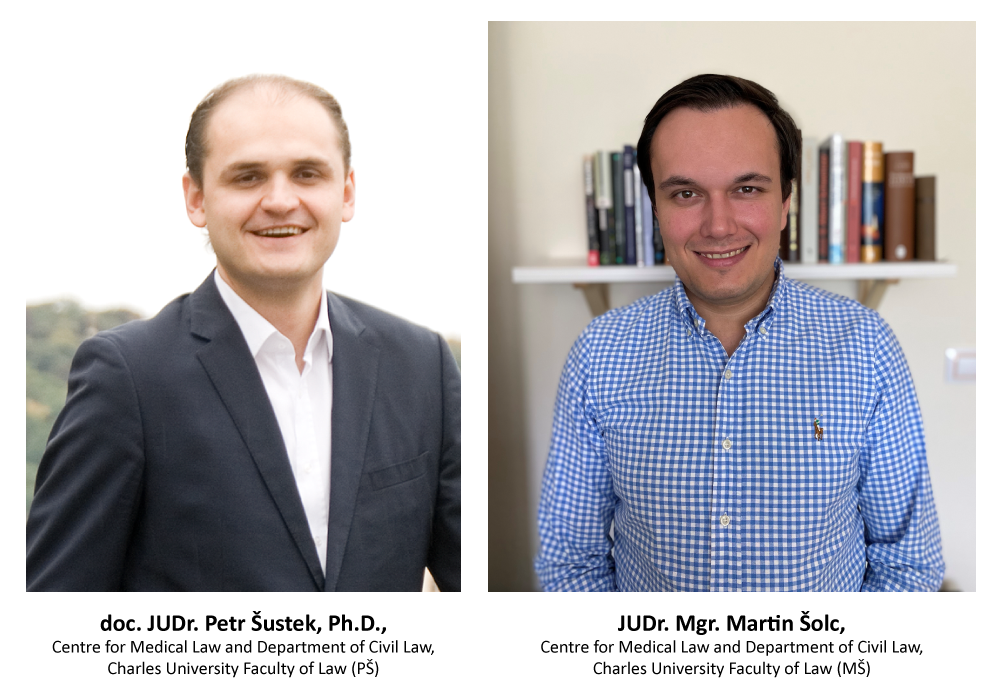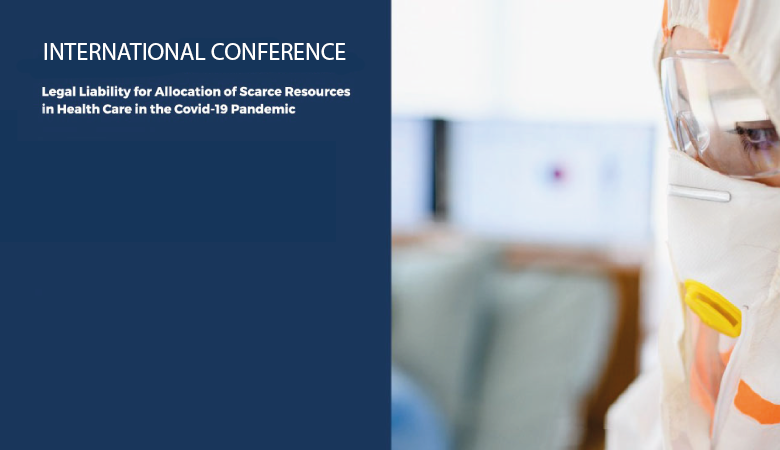Interview: Triage of patients during the pandemic? Doctors all around the world face legal uncertainty

Interview: Triage of patients during the pandemic? Doctors all around the world face legal uncertainty
The online international conference called “Legal Liability for Allocation of Scarce Resources in Health Care in the Covid-19 Pandemic” took place on 15 April 2021. Petr Šustek and Martin Šolc from the Centre for Medical Law of the Faculty of Law of Charles University told us more about the conference, and about the most interesting conclusions and recommendations for managing the pandemic from the legal and ethical perspectives. A number of speakers reporting on the situation in their country and special guests from abroad explored, among other topics, the difficult question of triaging patients who are in need of scarce resources, as well as the legal consequences of making “wrong” decisions.

Which findings mentioned during the conference did you personally find the most interesting or surprising (in both the positive and the negative sense of the word)?
PŠ: It is interesting just to see how different countries react to the threat of hospitals being overwhelmed. In some cases, the legislature had already provided for such crises, in others, regulation was only introduced with the outbreak of Covid-19. One such example is the British Coronavirus Act from spring 2020. Very often, the rules for prioritisation, or triage if you will, of patients are set out by specialised medical associations. However, these rules must always be within the limits of the law. This is where courts come into play, but since it is not in their power to decide in a matter of weeks, and these decision take months, perhaps even years, doctors all around the world are facing legal uncertainty as to how they should proceed.
MŠ: Yes, legal uncertainty is common to all countries, but in some places, it is greater than in others. It also depends on whether the legislature had prepared for potential crises in advance, and whether medical associations have the space to set the rules, in other words, where the limits mentioned by my colleague lie. In Italy, for instance, they have much more space to manoeuvre in this sense than in our country.
What do you think about our legal regulation in this area? Considering the ethical perspective, what do you think about the strictness of our legal regulation and sanctions? Is it possible to evaluate the regulation in terms of humanity and respect for people?
PŠ: The Czech legal regulation was drafted for standard situations. The legislature did not anticipate insufficient capacity on the level of the entire healthcare system at all. In the end, the situation was not that catastrophic in our country, but insufficient legislation for situations where the whole system is in crisis had a negative impact on some smaller hospitals that reached their capacity. If there is a lesson from the coronavirus pandemic for Czech medical law, then it is that rules, which are general but also comprehensible enough, should be made for the allocation of scarce resources. On the other hand, I would highlight that Czech law provides for the non-discrimination of patients, including on the grounds of age. As for the strictness of sanctions, I think that there are no major differences from other countries.

Are patients in some countries (as mentioned in your summary) rejected based on age, without considering other aspects of their health? Where exactly?
MŠ: Patients being rejected purely due to their age is something that is rarely discussed openly. There are reports saying that this was the case in Bergamo in Italy when the epidemic was at its worst there in spring 2020, that it was actual wartime medicine. Other sources say these reports are exaggerated or even false. I was surprised, for example, that the Brazilian official medical guidelines from 2016 expressly refer to the prioritisation of younger patients over older patients if they are comparable in terms of other clinical factors (e.g., chance of survival or comorbidities). The age factor alone in a situation where there are not enough intensive care beds is also mentioned, for example, in the guidelines of the Swiss Academy of Medical Sciences from April 2020, but the revised version of these recommendations from December no longer includes this part. A certain form of prioritisation of younger patients can also be found in some Australian guidelines. However, in most countries, age is only one of the criteria considered when evaluating a patient’s health and prognosis. The role that a patient’s age actually has in practice is another question.
PŠ: A lower standard of care for patients due solely to their age is definitely unacceptable. The biological age of a specific patient may be taken into account, but again only as one of the evaluation criteria of the overall condition or prognosis of the patient.

What are the bases of the different legal regulations? The prevailing opinion is that medical ethics is based on common moral and human values. Why then are there, in some cases, major differences in the legal regulation in different countries?
MŠ: Experts in medical ethics mostly agree on the general, well-known, and not very controversial questions, such as the importance of the patient’s informed consent, or palliative care. However, if we take a closer look at some more controversial or specific issues, we will see that there are several different movements in medical ethics, and even those include diverging opinions. The differences in the legal regulation in individual countries reflect the different value systems of the society, the financial possibilities and capacity of the healthcare systems, as well as the quality of legislation, its flexibility, etc. Unfortunately, Czech legislation did not really prove able to react quickly and coherently to a new situation in this crisis.
Legal regulations and, in particular, the guidelines of specialised associations from different countries, are usually based on the utilitarian requirement of maximising the number of lives saved. Some guidelines even expressly provide for this requirement. However, it is limited by the principle of non-discrimination. There are different approaches to how legal regulation deals with the basic dilemma – it is necessary to save as many patients as possible while not “sacrificing” anyone.
Do you think, considering the presentations given by the participants of the conference, that regardless of the applicable legal regulation, healthcare workers in general proceed ethically and sensitively? Do they have any strength left in such an intense crisis to also think about the legal aspects? Or do they rather rely on their intuition, their own experience, and inner personal or professional ethics?
PŠ: This is a very complex question, not only because it is often unclear what is ethical in a specific situation. I believe that most healthcare workers in all countries try to cope with the crisis to the best of their knowledge and belief. At the same time, they have been rightfully calling for a transparent legal regulation that would clearly set out the limits of what is allowed by the law. You obviously cannot study the intricacies of a legal regulation in a situation where you are responsible for a totally overwhelmed hospital department. That is why the law must be comprehensible and unambiguously define the limits in crisis situations.
How difficult is it to conclude that the decisions made by healthcare workers were wrong in such a demanding situation, where often every minute counts, they are working under constant pressure, they are exhausted, etc.? The evaluation of a mistake must be very complicated, just like evaluating the current situation when deciding about scarce resources. Should the law be more lenient in some cases regardless of the strict letter of the law?
PŠ: It can be very complicated, especially given the exceptional circumstances the doctors are working in. They must provide due professional care, de lege artis. However, the legal definition of the principle of de lege artis also includes taking into consideration the specific conditions and objective circumstances. This means, for example, that if there is not a doctor with the necessary qualifications available because everyone is busy taking care of other patients, the patient may be treated by a doctor with a completely different specialisation. It is better than if the patient were not treated at all. At the same time, it is not possible to refuse to provide acute care, the hospital must always take care of the patient somehow.
But obviously if there are not enough specific resources – for example, ventilators – there must be rules for allocating these resources to the patients. We must not forget that significant legal uncertainty regarding these rules exists everywhere in the world. Healthcare workers and hospitals can barely be certain that they are not breaking the law by their acts, although these are done in good faith. This is why I believe that in this context, the courts should interpret the law so as to not impose liability on the doctor who could not have known the exact requirements stipulated by the law while trying to save the patients. Of course, it is always necessary to protect the patient's rights, too.

Can we prevent or minimise similar situations in the future? Is the answer having more material in stock (which is likely not feasible due to the variety of possible scenarios), better informing healthcare workers, amending legal regulations, or changing established practices?
PŠ: Creating rational reserves is definitely necessary, also with respect to monitoring and assessment of the current situation, which changes very quickly in an epidemic. We all remember very well, for example, the tragic shortage of personal protective equipment in spring 2020. At the same time, we need to have processes in place that will help with securing the resources in sufficient amounts, as well as with organisational and specific clinical decisions during a crisis. So, I would say we should learn our lesson from the coronavirus pandemic and set out the rules on the level of the law, guidelines by specialised associations, and internal hospital directives in advance. Not that we do not have any such rules, but since we had not had problems in our part of the world for a very long time (in terms of dangerous infectious diseases, but also no wars or other disasters), we underestimated the preparation.
MŠ: After all, the Covid-19 pandemic is not an unprecedented event, historically speaking. We have faced worse infectious diseases, which were the leading cause of death for most of our history. I would consider this pandemic rather as a stark reminder that we must not become complacent and must be ready for potential threats.
Will the conclusions of the conference also be used in practice, offered to the authorities of individual countries, for example as proposals to change legislation? Are you planning anything similar in our country?
PŠ: The aim of the conference is not to exert coordinated pressure on national or other authorities, but to help specialists from many different countries to share their knowledge, experience, and opinions. These events add new impulses to the debate, they can have a unifying effect to a certain degree, and influence other interested groups, such as lawyers, doctors, specialised associations, and, in the end, perhaps even those state authorities. It is up to each participant in the conference to raise awareness back home. Talking about international debate, I would just like to mention that the conference proceedings are being prepared at the moment, which will include the papers presented by the conference participants. We believe they will be a valuable collection of findings and serve as a basis for further debate.

The aim of the conference was to share experience and opinions from around the world related to the question that has been weighing heavily on most healthcare systems: what are the rules for allocating scarce resources in the healthcare system to individual patients? Such scarce resources may be medical devices (such as mechanical ventilators), qualified healthcare workers, or hospital beds. This is closely related to the liability of healthcare providers for the damage incurred by the incorrect prioritisation of patients.

The conference was organised by the Centre for Medical Law of the Faculty of Law of Charles University in collaboration with the Department of Law of the University of Bergamo – universities in two countries that were hit very hard by the pandemic. In total, about 20 lawyers from 14 countries in Europe, the Americas, Australia, and Africa reported on the situation in their country. The host country was represented by Associate Professor Petr Šustek, Dr. Tomáš Holčapek, and Dr. Martin Šolc from the Centre for Medical Law of the Faculty of Law of Charles University and Professor Roberto Pucella and Dr. Massimo Foglia from the Bergamo Department of Law. Other speakers reporting on the situation in their respective countries included, among others, Professor Lance Gable from the US, Professor Karl Stöger from Austria, Dr. Inesa Fausch from Switzerland, Professor Fiona McDonald from Australia, and Professor Albert Ruda Gonzales from Spain. There were numerous passive participants too, as the conference was followed by several dozens of people.
The conference showed that individual legal orders have different approaches to the prioritisation of patients, but some elements of the legal regulation and related issues are quite similar in most countries. An example could be the prohibition of refusing patients based purely on their age without considering their health, which most (but not all) countries have in common. Prioritisation is usually carried out based on a complex evaluation of the patient's health and prognosis. However, there are significant differences in how detailed, specific, and transparent the rules of evaluation are. Basically, everywhere around the world the situation can be characterised by legal uncertainty, as the requirements set out by the law are not clear, and healthcare workers are left in the dark as to whether they are acting lawfully.
Special guests included prominent specialists in intensive care medicine or bioethics. Professor Craig Spencer talked about the situation in New York, and Dr. Lorenzo Grazioli explained what went on in Bergamo at the peak of the pandemic. Professor Vladimír Černý outlined the pandemic-related issues from the perspective of the healthcare system and the political situation in the Czech Republic. One of the most-cited researchers in bioethics, Professor Arthur Caplan, explored various questions related to the pandemic, including the use of new medicinal products (for example, Covid-19 vaccines) and “Covid passports” for vaccinated persons.
The conference proceedings should be published in the next few months, and will include structured national reports, as well as papers by special guests.
Mgr. Vlasta Tichá







